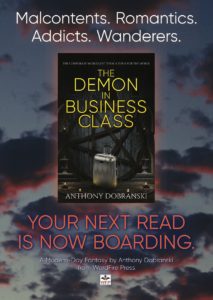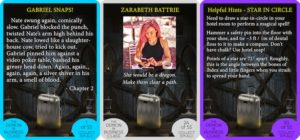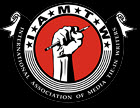Learning To Market My Book
Guest Post: Tony Dobranski
I signed my book contract in March 2016. Since then, my professional life has been a crash course in marketing, a mix of constant research and the ongoing leap of faith that I knew how to reach my audience.
*A Marketing Primer
Marketing is how you tell your audience about your book. Because it’s a message, it can have creativity and artistry to it. Marketing is always a business act, however. It connects you with your audience so your audience wants to buy and share your book.
The huge changes brought by ebooks, independent publishing, social media, fan conventions, and giant corporate media mergers have completely upended the publishing business. Whatever business structure helps you get your work out to the world, you are your best marketer, and you will be for years to come.
*A Marketing Plan
When WordFire Press asked for the manuscript of The Demon in Business Class, they also asked for a marketing plan. I took it very seriously, examining my market, publisher, and novel, with an honest if enthusiastic eye. Never hide from the truth of your book. All lemons are potential lemonade.
Demon is a hybrid novel with corporate thriller and romance elements and a literary style. It has a forward-looking, niche audience, not in the mainstream of the fantasy genre, and aimed at mature readers. It’s also an outlier in the WordFire Press stable, which tends to more adventure and to an all-ages audience.
This gives a granular answer for where I find my audience: eager for novelty, happy with a relaxed approach to genre, wants good writing but also a plot. Comfortable with mature content, even pleased to have it. Interested in travel. It suggests their likes, their touchstones, how to reach them and with what kind of attitude. It’s clearly a market my publisher has yet to tap.
Plus, this audience spans genres. Romance readers, thriller readers, and people who care what the New Yorker reviews all have a subset with these same tastes. With a scenario that depends on magic, fantasy is my natural starting point, but modern shopping makes genre labels less prominent. You don’t browse Amazon aisles the way you browse bookstore aisles.
For all these reasons, it was clear Demon would depend even more than most books on word-of-mouth – a long process, but one where an author can help.
*Learning to Con
It took eight months from when I signed my contract to when my book could be bought by the greater public – on the most aggressive timetable possible, to get to fall conventions before shopping season. The WordFire Press staff pushed tremendously hard to make a stylish, bold product in double-time. I needed to be ready to be its author!
One major outlet where an author can make a personal impact is at fan conventions. If you don’t think your niche has them, you haven’t looked hard enough! It’s a good idea to attend them before you have a book to sell, to see what works for you as a con-goer and what you need to do to make being a con-guest worth your while.
In the science-fiction and fantasy genres, cons differ widely. Festival cons, or comic cons, have tens of thousands of fans celebrating all fantastic genres, but emphasizing the visual. Though these cons have discussion panels and interviews with artists, they are foremost a huge marketplace, with the added draw of the costumed shoppers themselves. You can find readers there – if you’re eye-catching and fast. They are budget-conscious and overwhelmed by sights, but they are eager for some new thing. If you have that thing, it’s a positive connection.
This inspired a banner and marketing materials narrowly tailored for my audience’s sensibility, with edge, wit, and maturity all quickly established. It helped to have an amazing cover!
So far it’s working. I see my title or cover or banner catch eyes and draw smiles, long enough at least for me to engage people. Readers with different tastes walk on by, which is just as good – better no sale than an angry bad review!
Literary cons are smaller, scholarly events, with a pronounced emphasis on readers and writers. Though the membership is only in the hundreds, these fans are deeply connected in the word-of-mouth fan communities, and eager to discuss their genre with creators and with other enthusiastic fans. The high writer-to-reader ratio makes for engaging discussions in hallways and at bars and suite parties. New writers will find both fellowship and validation.
You may get a reading slot or autograph table, but new writers get noticed on panels. Be courteous, especially when you disagree, and knowledgeable. Engage questions creatively, and as positively as you can. You and the other panelists are together an event for the audience. Look for creative ways to turn questions around.
Involve the crowd. Remember – in each audience are likely readers of your book.
*Social Media
Curated corners of social media still feature long-form writing, but blogs are passing. If you look at social media as a marketing channel, you’re competing with many other voices – sometimes, your own friends! Make your posts image-driven, eye-catching and quick to read.
For a book release, YA paranormal writer Shannon A Thompson makes single image “book teasers” with a character’s backstory and a clipart image. https://shannonathompson.com/2016/06/15/ww-how-to-create-book-teasers-on-a-small-budget/ I saw them as a great way to create interest in the story. Not only were they vastly less expensive than a video trailer, each one could be shared on its own.
Keeping in mind my core audience, I wanted to share my style and my hybrid setting. One night, while drifting off to sleep, I remembered my old Star Wars trading cards. Perhaps it was my dreamy state, but I imagined them as a kind of shattered and reassembled movie trailer, with important moments in random order, something familiar yet offbeat. Perhaps I could make the offbeat a path to the familiar.
I developed my own trading cards, online images with sly quotes from the book, and clip-art lookalikes of my characters that I made more expressive using the online Prisma app:
I made fifty-six, to release daily on social media in the two months spanning my release, my first readings and my four fall cons.
They were popular, and easier to share across multiple platforms. People told me the quotes and visuals gave a much better sense of my book than the title alone. You can still see them on my Instagram! www.instagram.com/adobranski
People crave original content, even if it’s commercial. If you can express your sensibility in small, steady streams of content, social media can send it far and wide.
* Check Your Tech
Tablets and smartphones are tough for long-form writing, but they are essential for social media. Remember the Prisma app for modifying stock photos to use on Instagram? Prisma is ONLY made for iOS and Android, not for computer desktops. While you can view an Instagram feed on a computer, you can’t post to it – handhelds only.
I hope my approaches inspire you to take a fresh look at how you can find your audience, creatively and entertainingly. Each book has a different main and secondary audience, and a different publication path – giving a unique set of marketing opportunities. Maybe next year will be your year of marketing!



